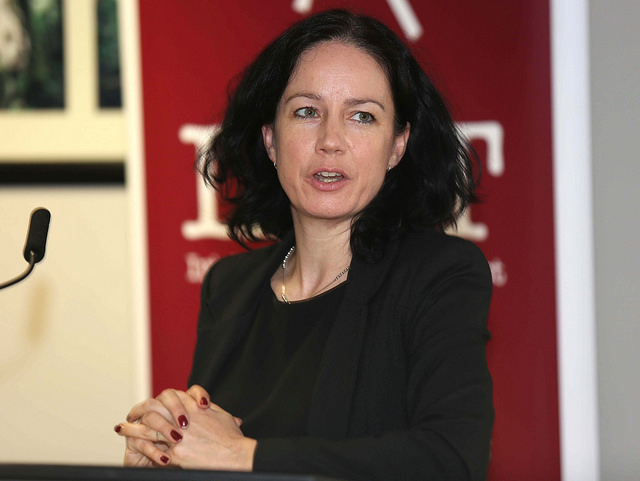Opportunities to improve outcomes for children with a parent in prison ‘being missed’

Fíona Ní Chinnéide
A new report by the Irish Penal Reform Trust (IPRT) has highlighted several gaps in policy and practice where the needs of children with a parent in prison are being overlooked.
The report, Piecing it Together: Supporting Children and Families with a Family Member in Prison in Ireland, is being launched by Children’s Ombudsman Dr Niall Muldoon this afternoon.
The report assesses progress since 2012 on a series of recommendations made to the government, the courts and Courts Service, the Irish Prison Service, the Department of Education, and media, among others.
The report highlights some pockets of good practice in Ireland, but concludes there are a number of significant gaps – including limited national recognition of the rights of children with a family member in prison, the continued lack of any national support services for these children, visiting conditions that are not child-friendly, limited data and research, and stigmatisation of these children and their families.
Speaking ahead of the launch, Dr Muldoon said: “Children with parents in prison are often the forgotten victims of crime and it is important for me, as Ombudsman for Children, to remind our State and our Society that they need to be supported.
“Having a parent in prison comes with a massive stigma and the necessity for secrecy for many children. Unfortunately, in Ireland, we know all too well the huge price children pay when they are forced to keep secrets.
“Prisoner’s children are the invisible victims of crime and, while they have done nothing wrong, the emotional, practical and psychological impact of having a mother or father in prison can be profound. We need to look at what we can do to make both the justice system and the prison system more child-centred.”
Research has shown that children who had a parent in prison reported higher levels of anxiety, lower levels of happiness, and higher levels of emotional difficulties.
The report published today also calls for inter-agency working to help recognise the needs of these children and support them.
IPRT executive director Fíona Ní Chinnéide said: “When society, through the courts, puts a parent in prison, this has a massive impact on their family. It can have negative impacts on a child’s health, education, and wellbeing.
“We need departments and their agencies to step up and join the dots to stop these children from falling through the cracks. We can no longer continue with the mindset that these children are ‘someone else’s responsibility’.
“For some of these children, the imprisonment of a parent is just one of the multiple adversities they are facing in their lives. Imprisonment of a parent is associated with a fivefold increase in exposure to other adverse childhood experiences (ACEs).
“We have to do much more to support these children and their families when their parent is in prison. We also have to ensure that imprisonment, particularly of expectant mothers and mothers of small children, is a sanction of last resort.
“Despite recommendations since 2012 for more data and research, we still don’t have an accurate picture of the number of children around Ireland who have a parent in prison. Without this data, we cannot ensure they are able to access the specific supports they deserve. Collection and publication of accurate data is crucial to inform service delivery nationwide and ensure the rights of these children are being met, while still respecting their rights to privacy.”
Ms Ní Chinnéide went on to highlight the rights afforded to children under the Convention on the Rights of the Child to maintain contact with their parents. She was hopeful that the rolling out of the vaccination scheme in prisons will offer hope for increased contact and visits with children.








